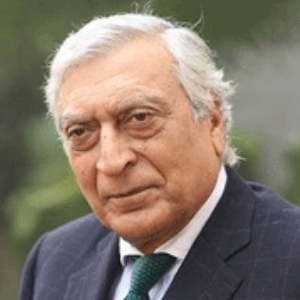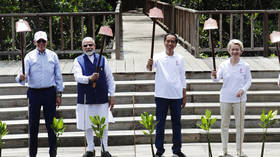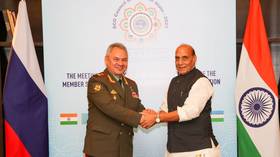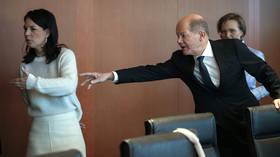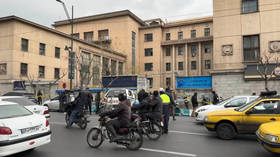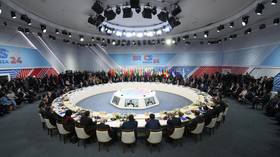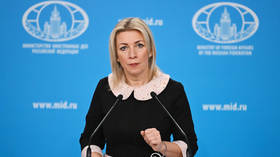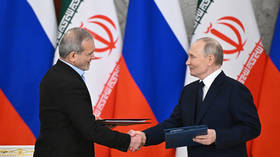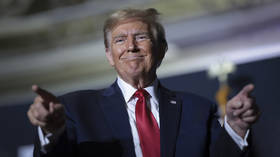Can Eurasia’s rising political bloc show a united front against the West’s encroachment?
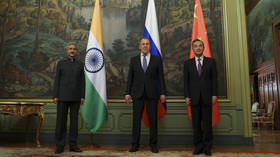
India, the current chair of the Shanghai Cooperation Organisation (SCO), will host the two-day Foreign Ministers meeting on May 4 in Goa, on the heels of a Defence Ministers meeting in New Delhi on April 27-28. The bloc continues to enlarge, bringing optimism to the members, but as new countries are added, new challenges within the group arise.
A Eurasian political, economic, international security and defense organization, the SCO is the largest bloc in the world in terms of territory and population. It was established in 2001 by China, Russia, and four Central Asian states: Kazakhstan, Kyrgyzstan, Tajikistan and Uzbekistan. India is not an original member and only attained full membership in 2017.
Russia has had very close ties historically with India and was supportive of New Delhi’s membership early after the SCO’s establishment. It was a practical move following the Russia-India-China (RIC) dialogue platform Moscow already set up in 2002. India’s inclusion in the SCO was a natural political extension of the logic of RIC as a non-Western grouping opposed to US unilateralism towards Central Asia as a whole. However, China insisted on linking India’s membership with that of Pakistan, whose membership in the SCO at that time seemed problematic. Some concerns may have existed regarding the potential spillover of India-Pakistan tensions into the SCO, but eventually, both India and Pakistan joined simultaneously in 2017.
Iran, bordering the Central Asian states and with close historical links with many of them, would have been a natural partner, but SCO members were reluctant to risk the organization getting entangled in nuclear proliferation issues surrounding Iran. Complications would have arisen from the UN Security Council sanctions imposed on Tehran approved by Russia and China as P5 members with non-proliferation commitments. Given the sharp deterioration of US ties with Russia and China, the geopolitical scenario has dramatically changed, removing earlier reservations, and now Iran is set to become a full member of the SCO this year.
The organization is a vehicle for the larger Eurasian region to capitalize on cooperative opportunities and address challenges autonomously from the West in a variety of spheres, including trade and economy, science and technology, energy, transportation, culture, education, and more. The West has dominated the international system for a few centuries, and the post-1945 global order reflects its hegemony. Despite the ongoing dispersion of political, economic and military power towards the East, the West still seeks to shape the changing global environment to its advantage by strengthening military alliances, military interventions, weaponizing its financial power through the reserve currency status of the US dollar, sanctions, extraterritorial application of its domestic legislation, and interference in the internal affairs of countries to promote human rights and democracies on a selective basis.
In contrast, the declared goal of the SCO is to strengthen mutual confidence and neighborly relations among the member countries to maintain and ensure peace, security and stability in the region and move towards the establishment of a new, democratic, just and rational political and economic international order. Principles of mutual trust and benefit, equal rights, consultations, respect for the diversity of cultures and aspiration towards common development guide its functioning. The SCO also seeks to combat international drug trafficking as a source of financing global terrorism with a focus on Afghanistan in particular.
The SCO, along with BRICS, is a building block for a multipolar global system. That goal is being advanced with more countries seeking links with it. Four countries – Afghanistan, Belarus, Iran and Mongolia – have “observer” status, and nine countries – Azerbaijan, Armenia, Cambodia, Nepal, Turkey, Sri Lanka, Saudi Arabia, Egypt and Qatar – have “dialogue partner” status.
A political balance is being maintained between Russia and China within the expanded adherents to the SCO. Moscow has interests with many of these countries such as Azerbaijan and Armenia (in conflict with each other with Russia trying to maintain peace) as well as Egypt and Saudi Arabia with which Russia has either close defense ties or energy coordination. Additionally, Turkey, a NATO member, is closely engaged with Russia in many areas and has an active presence in Azerbaijan and Central Asia. It has been sponsoring peace conferences in Afghanistan and Belarus as well as Mongolia.
Outside its extensive ties to all the core members of the SCO, China has enhanced interests in Cambodia, Nepal, Sri Lanka and Qatar.
Observer status for Afghanistan is logical based on its geographical location, despite concerns regarding its instability, conflicts, and subsequent overflow into neighboring countries.
India has stakes in the SCO for various reasons. It is a major Asian country, comparable to China in many dimensions, has historical connections and affinities with Central Asian countries, and New Delhi’s leaders have maintained close contacts with these countries since their independence. India’s rising economy can contribute to their economic growth and help balance their external ties with various power centers. Terrorism and religious extremism is a shared concern, but India is interested in regional connectivity projects linking it with this region. As a result, India has vital security interests in Afghanistan and must consult regularly with SCO members about the evolution of the situation there. Finally, India seeks to counter Pakistan’s efforts to prevent closer links between India and Central Asia.
As in the case of other international organizations, there is a gap between the purpose and practice in the SCO. The organization has extensive guidelines on peaceful resolution of conflicts, respect for territorial integrity, non-aggression, non-use of force or threats to use force, no military superiority in adjacent areas, counteracting terrorism, extremism and separatism in all its manifestations, etc. Despite these expressed SCO values, India and China are locked in disputes of territorial sovereignty and similar issues bedevil India-Pakistan ties as well. A large number of Chinese troops are currently massed on the Indian border contrary to past agreements, clashes have taken place and the danger of escalation exists. Meanwhile, India accuses Pakistan of nurturing jihadi groups and promoting cross-border terrorism.
The reality of international life and differences between states necessitates consistent efforts to address conflicting interests and find common ground where goals do not clash. The SCO provides a platform to achieve this, and the upcoming foreign ministers meeting under India’s chairmanship will hopefully advance the collective aims of participating countries amidst an international environment that is becoming more disruptive and confrontational.
The statements, views and opinions expressed in this column are solely those of the author and do not necessarily represent those of RT.
